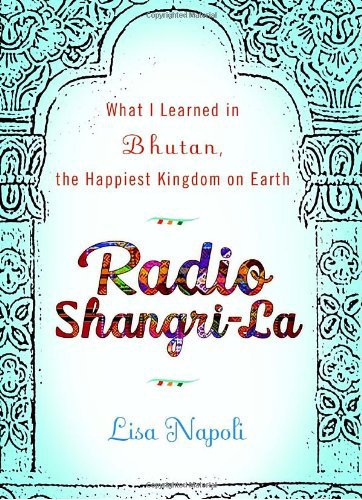“Yet if Akon and Christina Aguilera could dominate the airwaves—if cupcakes were being baked and Coca-Cola swigged and a person like me had been allowed in—anything was possible.”
I almost didn’t make it through the preface of this book. There are far too many white-woman-having-a-midlife-crisis-and-deciding-to-travel-around-the-globe memoirs out there, and this one certainly doesn’t start off any differently from the rest of them.

One of the differences that sets this book apart from the rest of the sludge is that the moments of clarity, the epiphanies, that often come at the end of other authors’ whirlwind tales are addressed at the very beginning. All the bullshit of Bhutan being a “relatively media-free universe” where “people made it a priority to look into each other’s eyes and communicate, soul-to-soul, uninterrupted…” is pulled towards the front of the book, which allows Napoli to transcend the platitudes.
The first moment where she does so comes relatively early in the book, and was the moment where I started thinking I might actually be able to read (and enjoy!) the book until the end. Rather than taking being swindled by a rinpoche and painting it in black and white (either by portraying all monks as terrible scammers, or whining about how a poor white woman was taken advantage of by a man of the cloth), she presented the whole ordeal rather plainly. Shit happens. Yes, this happens, and everyone knows it, and you just have to roll with the flow when it does. I really appreciated Napoli’s openness, her ability to describe things as they were without too much conjecture or judgment.
There’s a subtle irony in these types of memoirs that Napoli allows to come through her book. She was asked to visit Bhutan to assist with Bhutan’s first radio station, and despite her visions of training the staff to be professional on-air and to use the station “as a tool to prepare for [Bhutan’s] impending democracy,” they mainly wanted to know the best sites to download American pop music for their shows.
This book exceeded my expectations—in part because Napoli was a likable narrator. I couldn’t stand Gilbert, but Napoli struck me as the kind of person I would totally hang out with. She kept her identity while in Bhutan (“Since I had been told that it wasn’t disrespectful for a Westerner to wear Western clothing, I opted not to outfit myself in the Bhutanese national dress…” “As much as I think I comprehend the magnitude of the changes here in recent years, as compassionate a student as I may be of the impact media will have on the people, I am aware that I don’t really have any idea what it’s like to be Bhutanese…”) and experienced similar things that I have that I have had a hard time trying to explain to other people who just want the black-and-white.
All in all, a decent read. I’m giving this four stars. And if you’re thinking of reading “Eat, Pray, Love”–don’t. Read this instead!
Share this:




